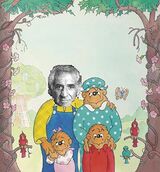Leonard Bernstein
Leonard Berstein (August 25, 1918 - September 12, 1984; also December 31, 1999 - January 1, 2000; and October 14, 1990 - Present) is a famous Superconductor and Supercomposer well known mostly for being in that R.E.M. song. He is the writer of many famous plagiarisms, including West Side Story (stolen from Romeo and Juliet), Candide (stolen from a book by Voltaire of the same name), Peter Pan (obviously stolen from Disney), and On the Town (stolen from the real-life city of New York, New York without even a single change to its name). What's more, he has successfully committed suicide three times; served as a busboy at the most famous Eskimo restaurant in Hell; and drawn a number of beautiful turkeys by embellishing on a tracing of his hand. Additionally, he invented both the square circle and the unhuffable kitten while employed at Aristotle's Logic Shack, a chain of philosophical drive-ins scattered across northern Missouri (and sister company to Prime Mover's Prime Rib). The icing on this delectable cake? Bernstein was a fruit who regularly cheated on his wife with other men (as his wife probably was a man). Bernstein even ended up leaving his wife in 1976 for his boyfriend. That bastard.
Bernstein also vaguely resembles Überconductor Herbert von Karajan. Thus, Karajan is suggested to be Bernstein's alter-ego who exclusively insults orchestras in German, as opposed to Bernstein, who insults orchestras in every possible language. Even German.
Life[edit]
Birth[edit]
Bernstein was born in the cities of New York, New New York, and Not-Quite-So-New York, first on August 25, 1918, again on October 14, 1990,[1] and a third time on December 31, 1999, twice to different Jewish families each having the last name of Bernstein, and most recently to two talking, fictional bears who mauled him to death shortly after being driven insane by the Y2K bug.
Childhood[edit]
As a child, Bernstein was often subjected to taunts because he was Jewish, most often by the local Nazi Party chapter, despite the fact his parents were registered members. He was also called "buttface" by other kids at his school. This, however, was not a baseless insult; Bernstein's face actually did quite resemble an ass. In high school, things did not improve. Bernstein became an outcast amongst the other men because he often wore stylish dresses to school, as well as makeup. Even Bernstein's teachers didn't like him. After a while enduring such stuff, though, Leonard ran away from home to become a conductor.
Family[edit]
Bernstein married the actress Felicia Montealegre Cohn (who had emigrated from the hot, saucy climate of Chili) on September 9, 1951. Together, the Bernstein and Cohn had three children: Jamie, Alexander, and Nina. Unfortunately, the older Bernstein grew, the more and more homosexual he became. Eventually, he left his wife in 1976 for his gay lover, Tom.[2] Of course, being the scumbag he was, Bernstein didn't return until he learned that she had been diagnosed with lung cancer in 1977.[3] Felicia Bernstein did not last very long against the disease. She died in 1978. Of lung cancer. Leonard Bernstein reportedly did not attend her funeral, while Herbert von Karajan attended and suffered an emotional breakdown and fits of sobbing during the services.
Death[edit]
Bernstein's deaths thus far have occurred on September 12, 1984, May 5, 1902, January 1, 2000, and October 14, 1990, though not in that order. Despite the fact he died four times, he still remains alive and fully-functional today, except for the fact he often feasts upon the flesh of the living to stay alive.
Censorship[edit]
Leonard Bernstein, amongst many, was one of the first conductors ever to make public television appearances beginning in the early 1950s. Because he was an asshole, though, Bernstein was often either blurred out or covered by a large black spot. Much of the music community went into uproar, especially the conductors because they were envious of Bernstein's ability not to have a face when they themselves did not have that ability because when they looked in the mirror there was still a face there and no black spot. Paul McCartney, then conductor of the London fruits and vegetables orchestra was so dissatisfied with his face that he tried to staple a black piece of paper to his eyebrows but, finding that the paper tended to disintegrate in the shower, settled in the end for a perpetual series of face lifts. The outrage faded with time, though. Censorship of Bernstein’s image, though, became commonplace, as well as the censorship of other conductors' images. A most famous example of this is Leopold Stokowski being completely hidden from view in the Disney movie Fantasia.
Conflict with the U.S. Government[edit]
In 2008, Stephen Colbert (a notorious bear-hater) was elected President of the United States of America almost unanimously.
Shortly after taking office, Stephen Colbert fulfilled his greatest promise to the voters: Protect everyone from the threat posed by godless killing machines. For Colbert, this meant defining Bernstein as not only an enemy of the United States, but also of all that is pure and holy (namely, the United States of America). Bernstein was forced to register with the city as a grave threat to public safety, unwilling to run the risk of being arrested and tortured with satire, puns, jokes, pranks, and whoopee cushions if he stayed unregistered.
Wanting nothing to do with such a great system, the Superconductor publicly burned his registration papers during a concert, setting off the concert hall’s fire alarm and bringing down a cold shower of rather wet water onto the audience. Moments later, Bernstein escaped from the hall, leaving behind a drenched New York Philharmonic in the middle of playing the Rite of Spring. The piece sounded no different than any recording of it. Regardless, the New York Times hailed it as the greatest performance ever.
After that incident, Bernstein became a hobo, living on the streets and hiding in trashcans. Bernstein soon found himself fiercely competing with other superconductors, bears, and men with German alter-egos for food until it came to the point where the Superconductor had to eat whatever he found: fruits, berries, assorted nuts, garbage, and small children as well as midgets. Despite this, Bernstein still conducted the New York Philharmonic every Tuesday, Wednesday, Thursday, occasionally Friday, but never Saturday. He still manages to elude authorities though.
The June Fourth Incident[edit]
In 2010, a sting operation was organized to capture Bernstein as he conducted the premiere of his newly written piece, "Plagiarism of Wagner" (which sounds very much like the "Ride of the Valkries"). Bernstein, though, had anticipated the sting for a long time.
Thus on June 4, 2010, as he was in the middle of conducting the piece, a S.W.A.T. team burst in and pumped Bernstein full of lead. He immediately fell to the floor, lying motionless as the S.W.A.T. team secured the rest of the area. Suddenly, though, Überconductor Herbert von Karajan appeared from out of nowhere, wearing a bulletproof vest. The man terrorized the SWAT team and then fled away into the night. When the team went to look for Bernstein, his body had disappeared. Still, the massacre didn’t stop the New York Times from calling the performance the greatest ever, beating the old concert where Ultraconductor Leopold Stokowski unzipped his trousers and proceeded to conduct the first movement of Beethoven’s Fifth Symphony with his penis.
Works[edit]
- "A Double Helping of Ostracism and Self-Loathing", for matzo ball, disembodied nose, and a pair of uneducated Wyoming ranch hands.
- "Prelude, Fugue and Yiffs" - An attempt to synthesize the formal structures of classical music with the improvisational mode of suddenly acting like a whole different fucking species. The sparse instrumentation after the initial presentation of the main theme brings to mind a bunch of would-be Emos (had they qualified for admission) smacking one another about with their imaginary tails in desperate, foundering attempts to achieve penile tumescence. The opening performance of this work caused riots of a magnitude unwitnessed since Stravinsky's "Le Sacre du Printemps". Only this time, the donnybrook was instigated ON STAGE, when the bassoons decided to rechristen themselves "bearsoons" immediately after some particularly hapless members of the clarinet section had chosen to become small, flightless, extremely tasty birds. Scored for those who never will.
- "Times Square 1944", best known for its subsequent remix by the infamously publicity-shy Italian-American DJ "R.Giul". To this day, no one knows the real identity of this sonic masterworker, who in 2002 succeeded in removing all dissonance and syncopation from this lively work - creating a chilled-out, ambient, and above-all Safe™ setting that earned him the great admiration of music critics all across the land, from Muncie and Rapid City to Lynchburg and Provo.
- "Chichester Psalms" - A triumphant first movement channels the energy that flashed through the veins of the newly liberated Jewish people as they attempted to jump the English Channel while carrying half a Psalm 100weight of bricks. The second movement finds our plucky Semites tunneling to Java, endeavoring to determine whether the Oriental nations rage and imagine vain things in quite the same fashion as do their Occidental counterparts. Psalm 2 is woven in a blur throughout, reminding us that, for these heroic Hebrews, "it wasn't easy... but nothing is". No. In the third and final movement, the work culminates in a masterful setting of Psalm 131 against the mellifluous vocal accompaniment of one Ron Obvious, of Neaps End, as he attempts to consume the cathedral to which the work is dedicated.
Notes[edit]
- ↑ Only technically. In fact, that is the given date that Leonard Bernstein's corpse reanimated, becoming a zombie.
- ↑ Bernstein also left his wife from May 5, 1902 - August 25, 1918. That was understandable, though, as Bernstein was, for that brief period in time, dead.
- ↑ Well, actually, he returned to her a few months before she was diagnosed, but that isn't as dramatic.



